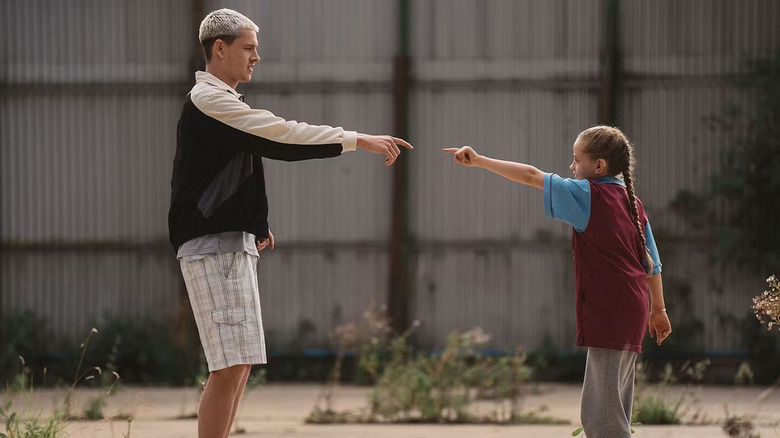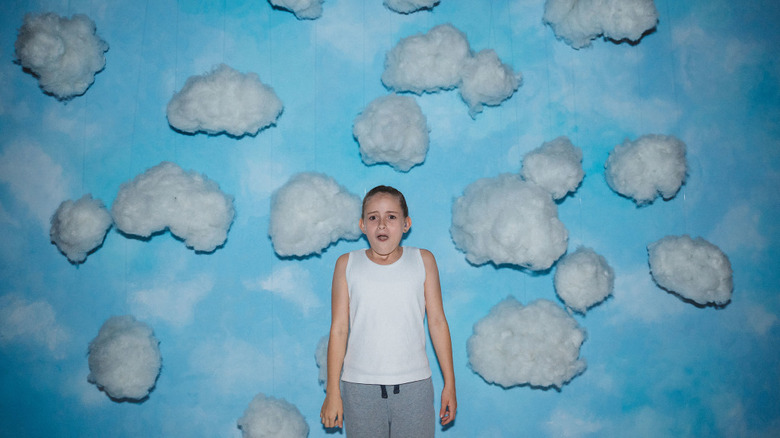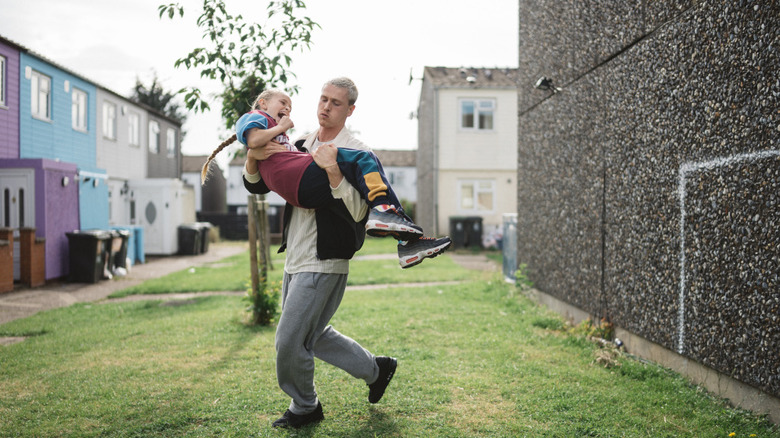Scrapper Review: A New Take On Social Realism Is Child's Play For Charlotte Regan
If someone built a stereotypical "Sundance movie" from spare parts, they might assemble a film resembling "Scrapper." A precocious child. An absent father. An up-and-coming star getting a real chance to shine. A sneakily pastel-filled color palette. An eclectic sense of visual style. A mixture of humor and heartbreak.
Charlotte Regan's freshman feature did, in fact, win the 2023 edition of the festival's Grand Jury Prize in the World Cinema Dramatic section. But that triumph is not because it checks all the boxes and meets all the criteria of the quirky little indie that could. Regan is not fulfilling the stereotype so much as she's undermining it from within.
The cinematic imagination flexed in "Scrapper" plunges viewers deeply into the subjective headspace of 12-year-old protagonist Georgie, embodied by the dynamite debut performer Lola Campbell. Before Regan even shows the film's pint-sized protagonist, she makes Georgie's handiwork known. "It takes a village to raise a child," the film's epigraph states ... only for the character to cross out the cliché and scrawl her own retort: "I can raise myself thanks."
Every choice Regan makes further closes the gap between the audience and the screen. The quirkiness is not some attention-grabbing affect. "Scrapper" is a bold act of cinematic imagination that captures the boundless of Georgie's boundlessly creative mind. Regan pulls off a tricky balancing act by keeping a consistent internal logic to her film but remaining as iconoclastic as her central character. The result is as electric as it is eclectic.
A dazzling directorial debut
Though the film's title refers to the resilient, rambunctious youth at its core, the moniker of "Scrapper" could just as easily apply to Charlotte Regan behind the camera. This cinematic Swiss Army Knife in the director's chair is as comfortable composing a droll, documentary-like tableau as she is plunging her camera into dizzying motion. (That's to say nothing of how sound and set design also help externalize Georgie's inner world.) Regan pitches her take on the British working class "kitchen sink" drama somewhere between the shaky-cam social realism of continental Europe and something as fantastical as "The Florida Project."
But "Scrapper" is more than just the sum of its influences. By indulging Georgie's grief-stricken flights of fancy as she navigates life without her beloved mother, Regan finds motivation beyond denial or defiance in her avoidance of miserabilism. She's putting the movie inside her character's mind up on the screen for everyone to watch as Georgie lives it. Her adventures and anguishes need not be filtered through the lens of poverty porn. Life is never purely depressing and dour for those experiencing adversity.
If there's any lesson from "Scrapper," it's that joy always finds a way. Regan shows Georgie experiencing plenty of it as she works to ingeniously maintain her independence. Determined to avoid going into foster care, she tricks neighbors and social workers alike into thinking an uncle is living in the flat with her. Along with her literal and figurative partner-in-crime Ali (fellow newcomer Alin Uzun), she subsists on stealing bikes around the neighborhood. Lola Campbell effortlessly sells her character's street smarts while subtly exposing certain undeveloped emotional instincts.
A different kind of father-daughter story
The arrival of Georgie's scuzzy deadbeat dad, Harris Dickinson's bleach-blonde Jason, has the immediate effect of clipping her wings. The apple didn't fall too far from the tree as her father can scam and scheme with the best of them, so he can immediately see through maneuvers that could get past others. With time, though, Jason begins to edge out Ali as her main companion in petty crime. It's "Paper Moon" for a new millennium, in other words.
There's a commonly held wisdom around parents who have children at a young age: they grow up alongside their offspring. Some element of this makes its way into "Scrapper," but Regan quickly moves beyond the obvious. That Georgie and Jason share similarly stunted, stifled maturities is not an observation the film builds towards — it's one that it departs from.
Regan might not take these characters in any particularly surprising directions, but she also doesn't really need to. The film gradually settles down from the playful — yet always purposeful — energy with which it storms out of the gate. As Jason tenaciously sticks around, this time seemingly for good, Georgie can ground herself more firmly in the reality surrounding her. When the need for boundless imagination dries up in "Scrapper," the bountiful insight into the characters begins.
Even in the film's brisk 84-minute runtime, Campbell and Dickinson get to play many vibrant variations of Georgie and Jason. There's no grand transformation in "Scrapper," but each of them coming to grips with the messiness of human relationships — especially their own — feels no less momentous. The film's center of gravity very much resides with Lola Campbell's Georgie, but Regan knows that the best way to add emphasis and empathy to any moment is simply to cut to Harris Dickinson's incredulous face as Jason tries to absorb his daughter's latest whim. In a still-burgeoning screen acting career, this role makes yet another fantastic addition to Dickinson's collection of lost boys.
This dynamic duo helps power the movie through its back stretch, where sincerity does give way to the occasional bout of sentimentality. But Regan achieves even the occasional sops to schmaltz in subtle, surreptitious shadings. "Scrapper" is just the kind of scrappy triumph its title indicates. It's not the newness of the materials that matters here — it's how they are assembled with such care and consideration.
/Film Rating: 8 out of 10


